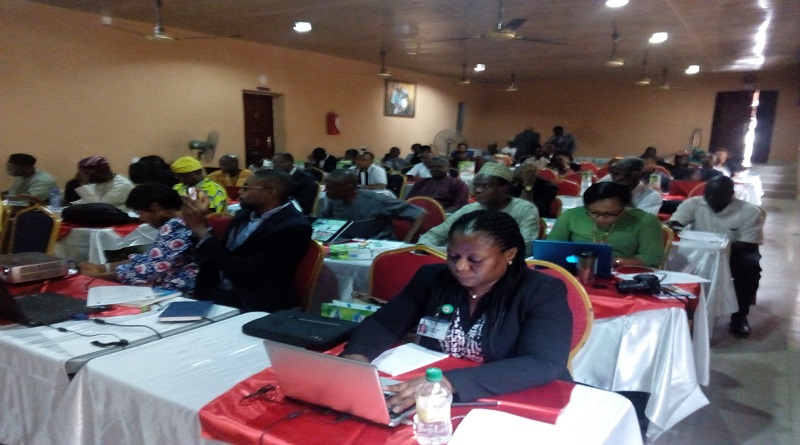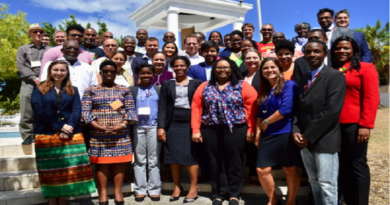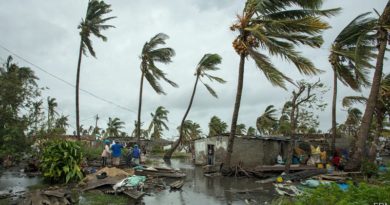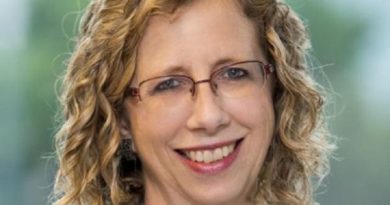Nigeria begins preparation of Third National Communication report
In view of the increasing vulnerability of the country to climate change challenges and the need to strengthen technical and institutional capacity to enable it respond effectively to the challenges and meet its obligations under the United Nations Framework Convention on Climate Change (UNFCCC), the Federal Government of Nigeria through the Ministry of Environment in partnership with the United Nations Development Programme (UNDP) has kicked off preparation of the Third National Communication(TNC) report.
Towards this, a two-day stakeholders inception workshop for the preparation of the TNC was held from 2-3 May, 2017 in Keffi, Nassarawa State where participants including government officials, academia, non-governmental organisations, private sector and the media were informed on the importance of the report and getting adequate data from various sectors to develop the TNC.
Background
Essentially, the preparation of the TNC and the strengthening of institutional and analytical capacities would enable the country to prepare improved climate change adaptation and mitigation strategies, enhanced technology transfer for adaptation and mitigation, and functional sustained institutional capacity for developing future national communications.
Besides, it intended to support the country to:
- Improve the National GHG inventory estimates and reduce uncertainty by adopting the current IPCC procedures for GHG Inventory;
- Generate reliable climate projections at country level using multiple climate models;
- Provide improved assessment of climate change impacts using multiple GCM scenarios and multiple impact assessment models at regional level taking into consideration the different ecological zones;
- Improved spatial vulnerability indices and profiles for different sectors and ecological regions;
- Enhance strategic frameworks for mainstreaming adaptation into national and state developmental programmes; develop strategies for effective estimates of the costs and benefits of adaptation and mitigation programmes; and strengthen institutional and technical capacities for continued preparation of NC and other new requirements under UNFCCC.
These activities would enable Nigeria to meet its obligations under UNFCCC as well as strengthen its capacity to address global climate change challenges with particular emphasis on mitigation, adaptation, vulnerability analysis and technology transfer.
It will also facilitate the country’s shift to low carbon green economy for sustainable development through the development of appropriate strategies and plans with the capacity that will be built in the implementation of the activities of the TNC.
Nigeria prepared and submitted its First National Communications (FNC) and Second National Communications (SNC) to the UNFCCC Secretariat in November 2003 and June 2014 respectively.
Opening session

In his opening remarks at the workshop, Permanent Secretary of the Ministry, Dr. Shehu Ahmed, said “we are meeting here today for the inception workshop on “Nigeria’s Third National Communication”. The main objective is to create an enabling process involving all relevant national stakeholders to prepare and submit Nigeria’s Third National Communication (TNC) to the United Nations Framework Convention on Climate Change.”
The PS, who was represented by the Director, Department of Climate Change in the ministry, Dr. Yerima P. Tarfa, said preparing “National Communication report presents huge opportunity for the collection of climate relevant data that will help us to better plan our economies and also respond to global challenges of climate change and commitments. In fact, the Third National Communication should present an opportunity to transform the process from merely reporting to development of a strategic and policy support tool.”
He noted that the First and Second National Communication provided the baseline information on inventories of greenhouse gases, mitigations, vulnerabilities and adaptation to climate change, awareness and education activities and proposed projects for further monitoring and mitigating climate change.
Ahmed, who assured that the Ministry, is committed to implementing the overall mandate of the Climate Change Convention and its Protocol also commended the UNDP for their invaluable support and partnership.
In his welcome address, Director, Department of Climate Change, Ministry of Environment, Dr. Yerima P. Tarfa, said science tells us that climate is changing partly due to human activity. He added that in a rapidly changing climate, we need science more than ever to help us understand the impacts of climate change, its risks, and options to address it. “It is heartwarming to state that Climate researchers are developing new methods to better observe the climate system and understand the processes at play.”
The Director, who was represented by Mrs. Halima Bawa-Bwari, Deputy Director, Department of Climate Change posited that the purpose of preparing National Communications is to ascertain the level of Greenhouse Gas composition in the atmosphere, the Vulnerability, Adaptation and Abatement analysis of impacts of Climate Change. It also serves as a basis for reference on future auditing of Greenhouse Gas Inventory in the country.
He went further, “The Department of Climate Change in collaboration with the UNDP have organised this stakeholder’s inception workshop, which has brought together the Inter-Ministerial Committee on Climate Change (ICCC), Academia, relevant private sector organizations, NGOs, and the Media to among other things assist all stakeholders and partners to fully understand and take ownership of the project.
“As we are gearing up now for the preparation of the Third National Communication, we need data, more especially Primary and spatial data to understand the processes at play and build projections we can trust. These are essential for sustainable development planning and strengthening resilience in our communities. Also, we need to fill the knowledge gap observed in the BUR and the previous national Communications. We therefore count on you as custodian of some of the needed data and information to make it available when we come calling in the near future,” he added.
UNDP Country Director, Mandisa Mashologu, in her remarks, said her organisation in partnership with the Federal Ministry of Environment have over the years invested in the preparation, collection and validation of data on GHG emissions which have resulted in the successful preparation and submission of Nigeria’s First and Second National Communications to UNFCCC.
She noted that the Third National Communications (TNC) will therefore be building on the strong national capacities developed with the support of UNDP and lessons learnt over the years.
“The TNC takes on a whole new significant meaning, coming on the heels of the country’s active participation in the negotiations, ongoing development of a Nationally Determined Contributions (NDC) and ratification of Paris Agreement by the President, with which Nigeria has clearly demonstrated political will and commitment to tackling climate change. This is why a national institutional framework approach, that will ensure full participation of relevant MDAS in the identification of potential for options for GHG emissions reduction across all sectors, sourcing of the necessary data is being promoted to improve the quality and consistency of the data and ensure reliability,” she added.
Presentations
Former Director, Department of Climate Change of the Ministry and Chief Executive Officer, Digital Environmental Management Systems, Dr. Samuel Adejuwon, presented papers on an overview of National Communications, Lessons Learned and Experience from Nigeria’s First and Second National Communications and UNFCCC Methodology and Guidelines for NC.
Other papers presented include “Timelines for the Preparation of the Third National Communication” by Engr. James C. Okeuhie; Defining the base year of the Third National Communication, by Lawrence Ibhafidon of Triple “E” and the Linkages between NDC, BUR and TNC for implementation of Paris Agreement by Prof. Emmanuel Oladipo.
This was followed by a break out session into three groups where the issue of Green House Gas Inventory and Mitigation Analysis; Vulnerability Assessment and Adaptation; and National Circumstance and Cross-cutting Issues were critically discussed.
Reactions
Dr. Samuel Adejuwon noted that the uncertainty age about climate change has passed and that if temperature continues rise, the global community must do something to reduce that which Nigeria must play its part. He added that lessons learnt from the First and Second National Communications should be taken into consideration while developing the TNC.
Besides, that effort should be intensify to sensitise the National Assembly for the money needed for the project and other environmental issues.
Professor Oladipo stressed that Nigeria should see the TNC as a report that is needed for development purpose and not just a report to be submitted to the UNFCCC,
“Let’s devise a way that we will make the government to see the TNC not just as environmental issue but as development issue,” he said.
Dr. Victor Fodeke said there are lot more to be done since Nigeria has committed itself to the Convention. He said advocacy should be strengthened to all the states and local governments.
Relevant suggestions on how to get data for the report and contact of focal persons towards the success of the project were offered by participants at the workshop.
Nigeria as a country has ratified the UNFCCC and submitted its Initial and Second National Communication reports in November 2003 and June 2014 respectively. It is in line with fulfilling its obligations to the Convention that the Government of Nigeria through the Department of Climate Change, Federal Ministry of Environment is initiating the process of preparing the Third National Communication report on Climate Change.




